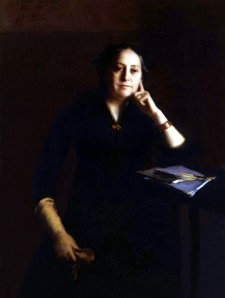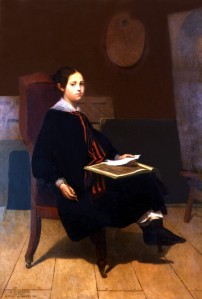 “My two daughters are very close”, Guizot wrote in 1838. “They share everything”. Henriette and Pauline, the names of the older Meulan sisters, were then nine and seven years old.
“My two daughters are very close”, Guizot wrote in 1838. “They share everything”. Henriette and Pauline, the names of the older Meulan sisters, were then nine and seven years old.
Forty years later, Henriette said to her two daughters Marguerite and Jeanne: “Will you ever love one another the way my Pauline and I loved each other?” Hardly a day went by when they did not speak or write to one another. The two motherless children were educated together with considerable care by the same people, principally their grandmother, Mme Guizot and her young, more educated friend, Rosine Chabaud-Latour. 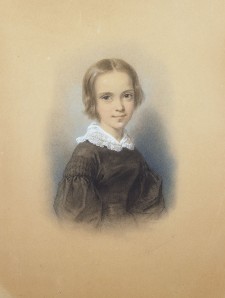 They grew up in the same places, shared the same governess, the very British Miss Wisley, fleeing together to London in February 1848, and were considered by all to be the inseparable Guizot sisters. It was therefore not surprising that within the space of two months, they both married the brothers Conrad and Cornélis de Witt, who were also very close. They then brought up their children together during the summers spent in Val-Richer and every separation was an ordeal for the two sisters. Pauline also contracted a lung disease and in February 1874, died in the arms of Henriette, who was the last person to see her alive and who then looked after her sister’s youngest children.
They grew up in the same places, shared the same governess, the very British Miss Wisley, fleeing together to London in February 1848, and were considered by all to be the inseparable Guizot sisters. It was therefore not surprising that within the space of two months, they both married the brothers Conrad and Cornélis de Witt, who were also very close. They then brought up their children together during the summers spent in Val-Richer and every separation was an ordeal for the two sisters. Pauline also contracted a lung disease and in February 1874, died in the arms of Henriette, who was the last person to see her alive and who then looked after her sister’s youngest children.
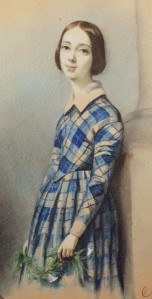 They were nevertheless very different personalities, “the elder is superior to the younger”, Guizot also wrote. In fact he had a preference for Henriette, and she is also the best known through the quantity of her correspondence and her writings, because she lived thirty-four years longer than Pauline and because it is her descendants who have maintained the family memory. In the eyes of her father, Henriette was the reincarnation of Eliza Dillon as she not only resembled her physically, her affection for him, already expressed at the age of 9 and verging on adoration – “I will spend my whole life with you”-, never faltered. In another sense, Henriette soon became indispensable to her father as the mistress of the house when he received guests in the Ministry, as an assistant in his intellectual works and as the administrator of the Val-Richer estate, where she ran the house and kept the accounts. Apart from her solid intelligence,
They were nevertheless very different personalities, “the elder is superior to the younger”, Guizot also wrote. In fact he had a preference for Henriette, and she is also the best known through the quantity of her correspondence and her writings, because she lived thirty-four years longer than Pauline and because it is her descendants who have maintained the family memory. In the eyes of her father, Henriette was the reincarnation of Eliza Dillon as she not only resembled her physically, her affection for him, already expressed at the age of 9 and verging on adoration – “I will spend my whole life with you”-, never faltered. In another sense, Henriette soon became indispensable to her father as the mistress of the house when he received guests in the Ministry, as an assistant in his intellectual works and as the administrator of the Val-Richer estate, where she ran the house and kept the accounts. Apart from her solid intelligence, 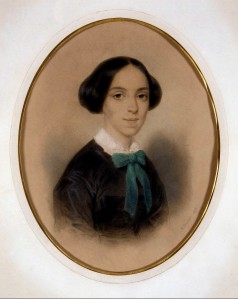 she had a serious nature that Pauline, who was more mischievous, a better musician, but also of more delicate health, lacked. She became ever closer to Guizot, if that was possible, during their period of exile in London from March 1848 to July 1849, where she had the material and emotional responsibility of her father, her sister and her brother Guillaume. In one way, she said, it was the happiest moment of her life, when she developed her attachment for the country and her command of English, a language she already knew, as did Pauline and Guillaume, as well as Italian and German.
she had a serious nature that Pauline, who was more mischievous, a better musician, but also of more delicate health, lacked. She became ever closer to Guizot, if that was possible, during their period of exile in London from March 1848 to July 1849, where she had the material and emotional responsibility of her father, her sister and her brother Guillaume. In one way, she said, it was the happiest moment of her life, when she developed her attachment for the country and her command of English, a language she already knew, as did Pauline and Guillaume, as well as Italian and German.
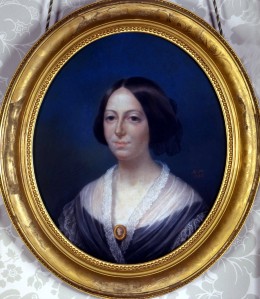 Conrad de Witt was five years her elder and a pious and distinguished companion, but never measured up to her. According to their grandson Jean Schlumberger, Pauline and Henriette should have exchanged husbands. Coming from an excellent Dutch family, their father had become a French citizen in 1806 and been appointed sub-Prefect of Amsterdam. Of the two orphaned boys, Conrad was less gifted intellectually than his younger brother by four years Cornélis, preferring manual work and outdoor activities to the reading and writing that were his wife’s main occupations. Guizot was enchanted by his sons-in-law. He wrote to Cornélis, “You and your brother have made my dreams come true and exceeded my ambitions.” But it was surely his daughters’ dreams and ambitions that were the priority! It would appear that Pauline’s marriage to Cornélis, who led a successful career in the financial and industrial sector before being elected Deputy of Calvados in 1871 and a member of the government from 1874-75, was happy from beginning to end, producing seven children, the youngest of whom was named François. Henriette’s marriage was dealt a blow at the outset when she lost her first daughter Eliza at the age of four months. This had a painful and lasting effect on the mother and to console the grieving parents, Guizot offered them a stay of several months in Rome.
Conrad de Witt was five years her elder and a pious and distinguished companion, but never measured up to her. According to their grandson Jean Schlumberger, Pauline and Henriette should have exchanged husbands. Coming from an excellent Dutch family, their father had become a French citizen in 1806 and been appointed sub-Prefect of Amsterdam. Of the two orphaned boys, Conrad was less gifted intellectually than his younger brother by four years Cornélis, preferring manual work and outdoor activities to the reading and writing that were his wife’s main occupations. Guizot was enchanted by his sons-in-law. He wrote to Cornélis, “You and your brother have made my dreams come true and exceeded my ambitions.” But it was surely his daughters’ dreams and ambitions that were the priority! It would appear that Pauline’s marriage to Cornélis, who led a successful career in the financial and industrial sector before being elected Deputy of Calvados in 1871 and a member of the government from 1874-75, was happy from beginning to end, producing seven children, the youngest of whom was named François. Henriette’s marriage was dealt a blow at the outset when she lost her first daughter Eliza at the age of four months. This had a painful and lasting effect on the mother and to console the grieving parents, Guizot offered them a stay of several months in Rome. 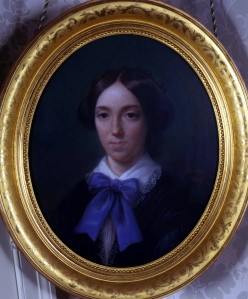 When Conrad, Henriette and their daughters Marguerite and Jeanne settled permanently in Val-Richer in 1855, the atmosphere may have sometimes seemed a little heavy to Henriette who could not express herself fully with her rather taciturn husband, even though it was evident that she was extremely fond of him and was very involved in his election to the General Council in Calvados, and then in 1885 when he became a Deputy. Whilst she wore herself out with numerous tasks, he wanted to transform the estate into a model farm and the technological innovations introduced at great expense soon created great financial difficulties, as Conrad was also a natural spendthrift. It was finally their sons-in-law Paul and Léon Schlumberger who saved the family from ruin.
When Conrad, Henriette and their daughters Marguerite and Jeanne settled permanently in Val-Richer in 1855, the atmosphere may have sometimes seemed a little heavy to Henriette who could not express herself fully with her rather taciturn husband, even though it was evident that she was extremely fond of him and was very involved in his election to the General Council in Calvados, and then in 1885 when he became a Deputy. Whilst she wore herself out with numerous tasks, he wanted to transform the estate into a model farm and the technological innovations introduced at great expense soon created great financial difficulties, as Conrad was also a natural spendthrift. It was finally their sons-in-law Paul and Léon Schlumberger who saved the family from ruin.
It was to overcome their financial difficulties that Henriette began very early on to write books, alongside her secretarial duties for her father. Between 1884 and 1904 under the name Mme de Witt née Guizot, she published nearly one hundred books, alternating between novels, moral tales and historical narratives. There were also many translations into English, namely of Shakespeare and Dickens, sometimes with Pauline and Cornélis, and other written publications. She also found the time and energy for charity work and opened an infant school for destitute children near to Val-Richer, set up a workroom in the neighbouring town and in 1882, founded with friends in Paris an organisation for women released from prison, in line with Guizot’s continued preoccupation with prison conditions.
But above all, she was dedicated to her father’s memory. Terminating after his death l’Histoire de France racontée à mes petits-enfants (The History of France told to my grandchildren) that they had written together, she then filed the archives and letters and published two volumes which were, for a long time, the only direct testimonies of Guizot’s personality, M. Guizot dans sa famille et avec ses amis (M. Guizot in his family and with his friends) (1880), Lettres de M. Guizot à sa famille et à ses amis (1884). Henriette’s second daughter, Jeanne Schlumberger, of whom her grandfather had been particularly fond since she was very small, lived until 1944. She was the last member of the family to have known François Guizot.
